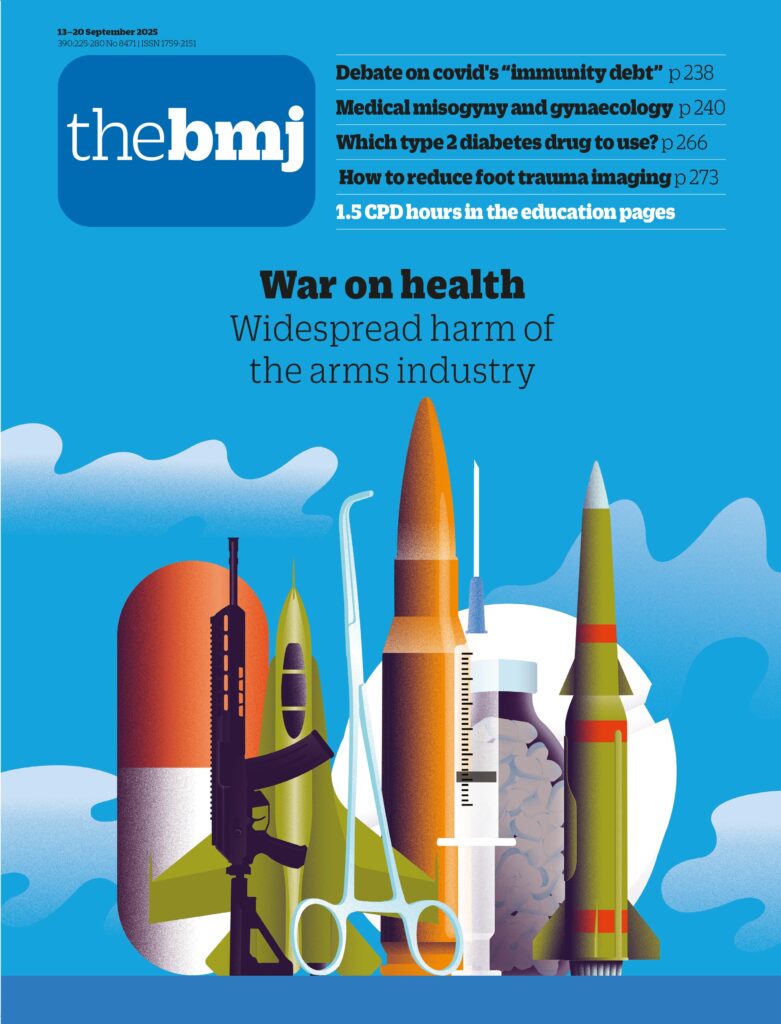- Scarlett McNally, professor
- scarlettmcnally{at}cantab.net
Follow Scarlett on X @scarlettmcnally
There was standing room only in my hospital’s big lecture theatre for a recent seminar about retirement from the NHS. I recognised many staff, now in their 50s and 60s, who I’ve worked alongside for a quarter of a century. It was palpably sad to see the NHS potentially losing so many experienced, wise people who know how things work and hold the collective memory of an organisation. The event felt like a surreal group lifestyle clinic with colleagues,1 and I sensed a cohort limping through their workload, hoping to reduce some heavy financial burdens and get a chance to breathe.
Many doctors assume that perfectionism and presenteeism are the only acceptable ways of working until they suddenly stop for retirement. It’s precisely this approach to work that can lead to burnout, poor retention, and staff retiring earlier than they might. But the NHS now offers more flexible ways of working, which can prevent people from leaving medicine at any life stage—including beyond retirement age.
I’ve written before about why support for flexible training and part time working should be built into medical careers.23 Senior doctors are important in modelling the cultural change that allows flexible working to be seen as a viable option. Finances can be tighter when you work more flexibly, but my own part time schedule and multiple other activities are made possible because I have NHS income from a now frozen level 9 local Clinical Excellence Award.4 For new applicants, the replacement Clinical Impact Award is smaller, but it still gives much needed help and aims to value good work.5
If more staff embraced flexibility earlier in their careers, they might be less likely to retire early and more likely to continue contributing to the NHS in some capacity after reaching retirement age. The NHS now has good initiatives to help retain senior staff, such as “retire and return” or partial retirement,6 but these should be known more widely and promoted more heavily.
Frank and factual
Money, ageing, and death are often taboo topics, and retirement overlaps with all three. But as we looked through the pension slides and asked questions, I was struck by the financial professionals’ candid explanations and expectation setting. All of life was laid out frankly, in factual terms. There were slides about death-in-service benefits and questions about splitting pensions in divorce. We noted the gender pension gap—a consequence of women doctors’ average hourly wage being 12-15% less than men’s.7 We didn’t mind being told that statistically we’ll have only a quarter of our lives left at retirement.
As I’ve progressed through my career, I’ve got better at being similarly upfront with patients. This is critical for discussing the benefits, risks, alternatives, and no treatment (BRAN) options for treating a health problem, so that patients can truly be involved in shared decision making.8 We’re exhorted to be kind,9 but sometimes the kindest thing is to acknowledge what people want to do with their life and to put their multiple health conditions into perspective. Senior clinical staff often have the experience to carry risk and understand the options, and it’s one of the many reasons for retaining them.
As another generation of politicians and policy makers attempts to reorganise healthcare delivery, we must keep the experienced senior clinicians who help to improve people’s health, not just provide healthcare. Harnessing flexible ways of working across the lifespan of our medical careers, with better promotion of initiatives aimed at retaining senior staff, can help us keep the wisdom and generalism that come with experience.
Footnotes
-
Competing interests: Scarlett McNally is a consultant orthopaedic surgeon, honorary clinical professor at Brighton and Sussex Medical School, deputy director of the Centre for Perioperative Care, and past president of the Medical Women’s Federation.
-
Provenance: Commissioned; not externally peer reviewed.

